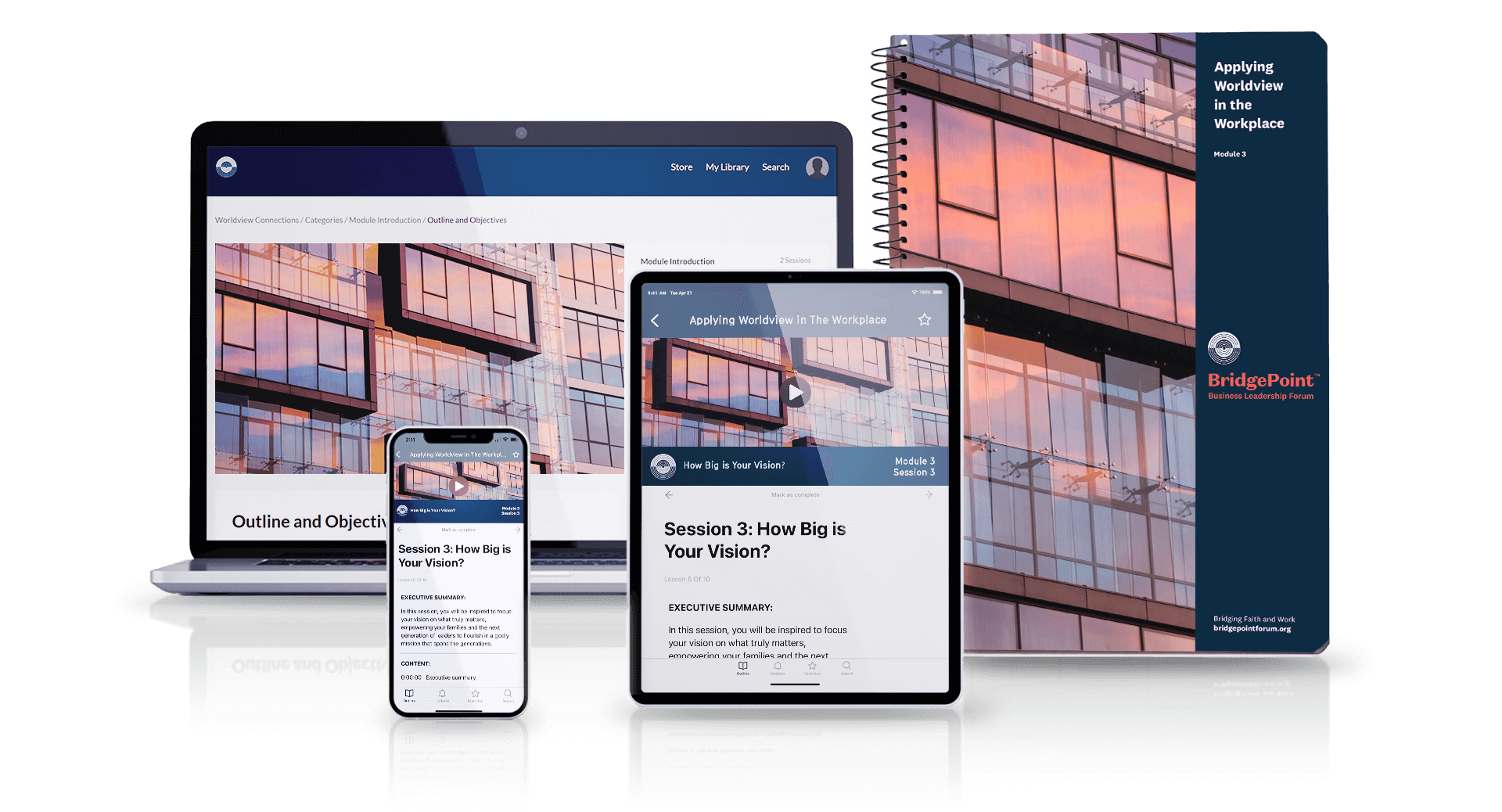
Applying Worldview in The Workplace | Module 3
How understanding a biblical worldview of economics creates strategic work
Executive summary
Module 3 will focus on how to apply biblical principles to your vision and work strategically. Working strategically requires faith to discover what it means to be a value provider to others in and through your work. You will be challenged to build a generational vision that is big enough but uniquely focused within the boundaries of your calling. In this module, as an employee, you will identify the areas of personal discipline you need to embrace, and you will discover what it means to provide value to your company and its clients. As a business leader, you will be challenged to value those on your team through the work culture you build and your investment in them through transformational training and professional development.
Contents
Session 1:
Living and Working Strategically
Session 2:
The Power of Obedient Faith
Session 3:
How Big is Your Vision?
Session 4:
Where is the Value?
Session 5:
The Economics of Obedience and Boundaries
Session 6:
Understanding the Distinctions Between Teaching & Training – I
Session 7:
Understanding the Distinctions Between Teaching & Training – II
Objectives
Plan how to accomplish the goal of investing wisdom and wealth in your children and those for whom you are responsible in the organizations you lead.
Understand God’s standards for what constitutes proper service and success and how to generate more value in managing the products, resources, and relationships you oversee.
Identify and honor God-ordained boundaries in your life designed for your well-being and future productivity.
Develop the traits of an effective trainer who empowers your team to grow in the skills and knowledge they need to succeed.
Resources
Access to all audio and video lecture presentations through our online platform and Kajabi mobile app.
Rich session notes of the lectures, with reflection questions, team discussion points, probing worldview questions, inter-generational discussion prompts, and strategic application assignments.
Thought-provoking interviews that set the material within recent economic and business trends.
A printed spiral-bound workbook.
Course content and conversations
Living and Working Strategically
Session 1
Thinking generally about the issues and problems we face in today’s world, we discuss the most relevant character training necessary for emerging Christian leaders. We discuss what we must be prepared to deal with today that we wouldn’t have thought a necessary part of leadership training a generation ago.
The Power of Obedient Faith
Session 2
In this session, we look at the prominence faith and trust in God play in our work, particularly in response to how we deal with failure. The world typically uses human reason or selfish desires as the basis for decision-making in response to problems and failures. We will be challenged to apply biblically-based faith to our work in a way that is attractive to non-believers.
How Big is Your Vision?
Session 3
As we survey current culture, the curse of Mal. 4:4, where the hearts of the generations have turned away from each other, is now more prevalent than ever before. In this discussion, we attempt to identify some specific items that the younger and older generations must do to heal the inter-generational breach that has occurred.
Where is the Value?
Session 4
In this conversation, we discuss why service is such an effective means of leadership in contrast with some who argue that adopting a “command and control” style is easier and more effective. In today’s competitive labor market, providing value in our work is the key to job performance and security. Beyond providing financial value to the company, we discuss other ways workers can think about contributing value.
The Economics of Obedience and Boundaries
Session 5
In this conversation, we discuss how Western economics has gone outside the legitimate boundaries of limitation. We explore the motivations to do so, and why will this, in fact, hurt those economies in the long-run.
Understanding the Distinctions Between Teaching & Training Session 6: Part I
We begin our study of the distinctions between teaching and training and how the training process requires clearly defined expectations and a clear emulation and adoption of constructive habits. This lesson focuses on the dynamics of learning that produce transformation in the lives of individuals and organizations.
Understanding the Distinctions Between Teaching & Training
Session 7: Part II
The purpose of this session is to develop successful training of those whom God has placed in our care. We discuss the emotional obstacles that need to be cleared for training to become more effective.

